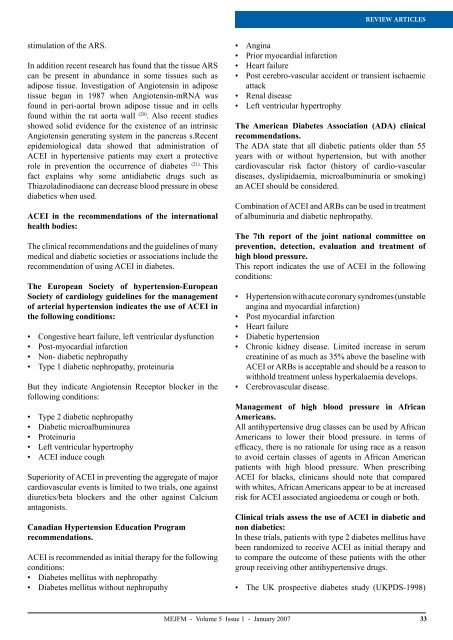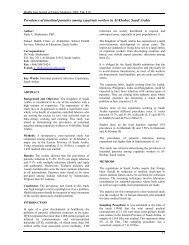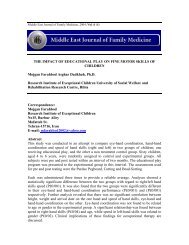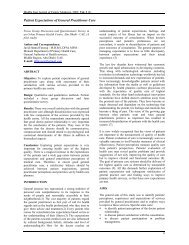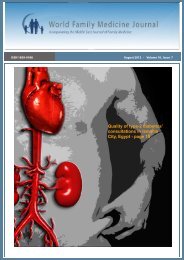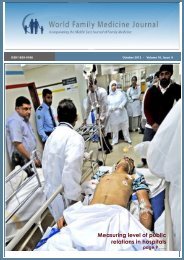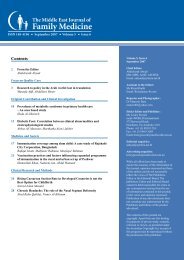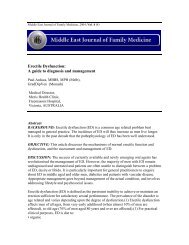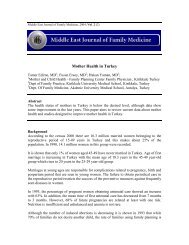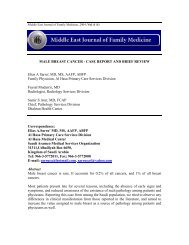Contents - Middle East Journal of Family Medicine
Contents - Middle East Journal of Family Medicine
Contents - Middle East Journal of Family Medicine
Create successful ePaper yourself
Turn your PDF publications into a flip-book with our unique Google optimized e-Paper software.
REVIEW ARTICLESstimulation <strong>of</strong> the ARS.In addition recent research has found that the tissue ARScan be present in abundance in some tissues such asadipose tissue. Investigation <strong>of</strong> Angiotensin in adiposetissue began in 1987 when Angiotensin-mRNA wasfound in peri-aortal brown adipose tissue and in cellsfound within the rat aorta wall (20) . Also recent studiesshowed solid evidence for the existence <strong>of</strong> an intrinsicAngiotensin generating system in the pancreas s.Recentepidemiological data showed that administration <strong>of</strong>ACEI in hypertensive patients may exert a protectiverole in prevention the occurrence <strong>of</strong> diabetes (21). Thisfact explains why some antidiabetic drugs such asThiazoladinodiaone can decrease blood pressure in obesediabetics when used.ACEI in the recommendations <strong>of</strong> the internationalhealth bodies:The clinical recommendations and the guidelines <strong>of</strong> manymedical and diabetic societies or associations include therecommendation <strong>of</strong> using ACEI in diabetes.The European Society <strong>of</strong> hypertension-EuropeanSociety <strong>of</strong> cardiology guidelines for the management<strong>of</strong> arterial hypertension indicates the use <strong>of</strong> ACEI inthe following conditions:• Congestive heart failure, left ventricular dysfunction• Post-myocardial infarction• Non- diabetic nephropathy• Type 1 diabetic nephropathy, proteinuriaBut they indicate Angiotensin Receptor blocker in thefollowing conditions:• Type 2 diabetic nephropathy• Diabetic microalbuminurea• Proteinuria• Left ventricular hypertrophy• ACEI induce coughSuperiority <strong>of</strong> ACEI in preventing the aggregate <strong>of</strong> majorcardiovascular events is limited to two trials, one againstdiuretics/beta blockers and the other against Calciumantagonists.Canadian Hypertension Education Programrecommendations.ACEI is recommended as initial therapy for the followingconditions:• Diabetes mellitus with nephropathy• Diabetes mellitus without nephropathy• Angina• Prior myocardial infarction• Heart failure• Post cerebro-vascular accident or transient ischaemicattack• Renal disease• Left ventricular hypertrophyThe American Diabetes Association (ADA) clinicalrecommendations.The ADA state that all diabetic patients older than 55years with or without hypertension, but with anothercardiovascular risk factor (history <strong>of</strong> cardio-vasculardiseases, dyslipidaemia, microalbuminuria or smoking)an ACEI should be considered.Combination <strong>of</strong> ACEI and ARBs can be used in treatment<strong>of</strong> albuminuria and diabetic nephropathy.The 7th report <strong>of</strong> the joint national committee onprevention, detection, evaluation and treatment <strong>of</strong>high blood pressure.This report indicates the use <strong>of</strong> ACEI in the followingconditions:• Hypertension with acute coronary syndromes (unstableangina and myocardial infarction)• Post myocardial infarction• Heart failure• Diabetic hypertension• Chronic kidney disease. Limited increase in serumcreatinine <strong>of</strong> as much as 35% above the baseline withACEI or ARBs is acceptable and should be a reason towithhold treatment unless hyperkalaemia develops.• Cerebrovascular disease.Management <strong>of</strong> high blood pressure in AfricanAmericans.All antihypertensive drug classes can be used by AfricanAmericans to lower their blood pressure. in terms <strong>of</strong>efficacy, there is no rationale for using race as a reasonto avoid certain classes <strong>of</strong> agents in African Americanpatients with high blood pressure. When prescribingACEI for blacks, clinicans should note that comparedwith whites, African Americans appear to be at increasedrisk for ACEI associated angioedema or cough or both.Clinical trials assess the use <strong>of</strong> ACEI in diabetic andnon diabetics:In these trials, patients with type 2 diabetes mellitus havebeen randomized to receive ACEI as initial therapy andto compare the outcome <strong>of</strong> these patients with the othergroup receiving other antihypertensive drugs.• The UK prospective diabetes study (UKPDS-1998)MEJFM - Volume 5 Issue 1 - January 2007 33


